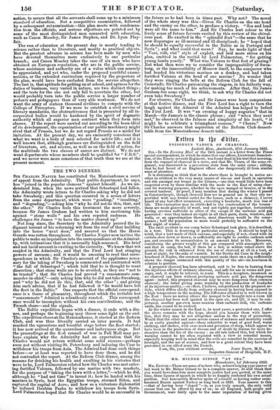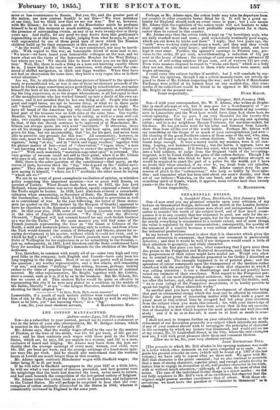MR. MILNER GIBSON "AT BEA."
Manchester, lst February 1855.
Ma, Enrron—There are some of us here who, acknowledging your answer of last week to Mr. Milner Gibson' to be a complete answer, do still think that you would have done him more complete justice bad you quoted, at the same time, those figures of speech in which he so happily confessed his own actual position. Our honourable Member spoke of yourself as having rather coun- tenanced Russia against Turkey so long back as 1835. Your answer, to this —that of having been "duped "—is, as you truly remark, the only valid excuse that can be offered by any of us; as all England, both people and Government, were fairly open to the same imputation of having given more or less countenance to Russia. But you, Sir, and the greater part of the nation, are now content frankly to say this—" We were mistaken at one time, but we think now that we see our way." Not so, however, with Mr. Gibson ; for in his speech at the Manchester soiree he professes himself to be at this moment as much nodding, confounded, or mystified in the presence of surrounding events, as any of us were twenty-five or thirty years ago. And really, for any good we may derive from this gentleman's representing us at this time, we might, judging from what he says, be just as well represented by one of those great men of snow which the Russian children build up for their amusement at this season of the year.
"As the world," said Mr. Gibson, "is now constituted, war may be inevit- able. With regard to this war, an honourable friend of mine said to me, We know—we have heard your honourable colleague on the war, and we know what are the views of the honourable Member for the West Riding; but where are you ? We should like to know where you are on this ques- tion.' Well, Sir, there is such a thing as a man not knowing exactly where he is. I know that is the case at sea sometimes, with ships under the com- mand of skilful navigators, in thick and foggy weather. When they have not had an observation for some time, they have a very vague idea as to their actual situation."
Are we, Sir, to attribute this ridiculous picture of himself to the speaker's ready or premeditated wit, or was it one of those involuntary proceeds of the mind in which a man sometimes ups a good thing by misadventure, and makes himself the butt of his own drollery ? Mr. Gibson's quandary, notwithstand- ing his long experience, as to his proper whereabouts, is all but equal to that of the metaphysician who has worked himself up into a doubt of his own ex- igence, and is not satisfied that he has any being at all. People who make great and rapid turns, are apt to become dizzy, or what we in these parts call "dazed "—confused in thought, and dimmed and double in sight. We have all heard of the American boy who could turn round so fast that the hind part of his trousers was on both sides at the same time. Our worthy Member, by his own words, appears to be taking, as well as a man well can take, two exactly opposite views on the one question, in the same speech. So that, if this war should continue to be approved of at Manchester, Mr. Gibson can always quote his own word "inevitable." If otherwise, there are all his strange expressions of doubt to fall back upon, and which will prove for him, but too incontestibly, that "he, for his part, had never been able to perceive any grounds for this war." All commentary, however, in this case must be insipid. The orator's own figures of speech—" skilful na- vigators,' being "at sea," and in "thick and foggy weather," together with his plainer matter of fact—want of " observation," " vague ideas," a man "not knowing where he is," and having to answer the question "where are you ?" With such materials, " materiam superabat opus" is reversed. The very genius of sarcasm could not add to their point, when it is Mr. Gibson who says it all, and he says it in describing Mr. Gibson's predicament. Still, there is the sober question of the constituency—that party, on the waves of state, however thick the "fog,' who depend on the " skilful navi- gator." They also are in their predicament. If he, after all, is only just now saying to himself, " where am I?" methinks the other must be saying " where are we?"
We are in no want of great examples in vacillation of opinion, or mistaken policy respecting this important question—war or peace with Russia, on account of Turkey. When Russia made her move in 1822, the late Lord Holland, whose patriotism was never doubted, openly expressed a desire that the Turks might be beaten. In 1828, Lord Aberdeen evinced a remarkable calmness when announcing, as Secretary of State, the Russian blockade of the Dardanelles; a blockade which, I believe, extended to provisions as well as to contraband of war. In the year following, the latter of these states- men (as quoted on the 26th instant by the Marquis of Granby) appeared to have no objection to the Russian's extending his conquests to Constantino- ple. In that year also, 1829, some of our leading journals were indignant at the idea of English intervention. " We trust," said the Morning Chronicle, "England will not commit herself for any such foolish business as a war for the Turks." In the same manner you will find some of the French journals representing the Czar as " the Giant or Colossus of the North, a mild and moderate prince, invading only to restore, and from whom the Turk would demand the cession of Sebastopol and Odessa, places for in- suring development to his marine, without which it could not exist, and to which he had a right" ; while other French journals were reproaching the Duke of Wellington for his supineness in so far submitting to the Russian — just as, subsequently, in 1831, Lord Aberdeen and the Duke condemned Lord Grey for acceding to Louis Philippe's demands for the abolition of the Belgic fortresses.
You, therefore, in common with nearly all of us—some very high and very good folks in the company, both English and French—have only been too long napping in the time past. Most of us are now pretty well at home on the question ; my worthy representative, and a few others, still remaining " at sea," and rather drifting " than sailing, because, perhaps, looking rather to the tides of popular favour than to any defined haven of national interest. My other representative, Mr. Bright, together with Mr. Cobden, steer a course, such as it is, if it be on to the brokers. But Mr. Gibson, Sir, has no course at all. This modern Hylas would be quite as effective in representing this city if he were now placed in a ceckboat in the middle of the Baltic, literally " at sea "—the League Hercules, alarmed for his safety, shouting for their adopted boy :
" ut litus, 11)1a, 11)1a mine sonaret."
Lamentable, if a youth of such mature abilities were vanished away, like him of old, by the Nymphs of the deep ! But he might as well be anywhere there as be here, yet " not knowing where," in a "fog



































 Previous page
Previous page